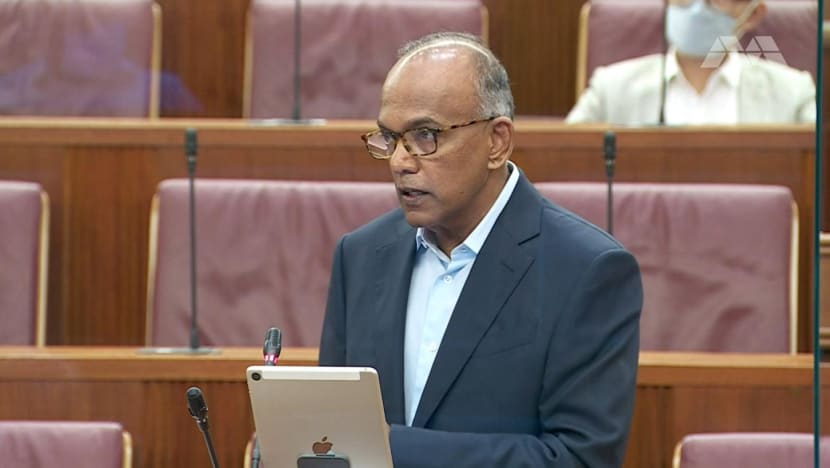Government considering 'best way forward' on 377A, will respect different viewpoints: Shanmugam

Law and Home Affairs Minister K Shanmugam speaking in Parliament during the Ministry of Home Affairs' Committee of Supply debate on Mar 3, 2022.
SINGAPORE: The Government is considering the “best way forward” on Section 377A, which criminalises gay sex, and in doing so will respect different viewpoints and consider them carefully, said Law and Home Affairs Minister K Shanmugam on Thursday (Mar 3).
“And if and when we decide to move, we will do so in a way that continues to balance between these different viewpoints, and avoids causing a sudden, destabilising change in social norms and public expectations,” he said in Parliament.
“Policies need to evolve to keep abreast of such changes in views. And legislation needs to evolve to support updated policies.”
Mr Shanmugam was speaking during the Ministry of Home Affairs’ (MHA) Committee of Supply debate, following the Court of Appeal dismissing challenges to Section 377A of the Penal Code on Monday.
The Attorney-General’s Chambers (AGC) is currently looking at the Court of Appeal’s decision carefully, he said.
Section 377A states that any man who commits any act of gross indecency with another man in public or in private can be jailed for up to two years. This extends to any man who abets such an act, procures or attempts to procure such an act.
The challenges were mounted by marketing executive and disc jockey Johnson Ong Ming, retired general practitioner Roy Tan Seng Kee and Bryan Choong Chee Hoong, the former executive director of LGBT non-profit organisation Oogachaga.
High Court judge See Kee Oon dismissed their challenges in March 2020, and the three men turned to the Apex Court to appeal against the decision.
COURT’S DECISION “CONSISTENT” WITH PAST POSITION ON 377A
Mr Shanmugam noted that successive court judgments over the years have “consistently” taken the position that “these are highly contentious social issues and within the province of Parliament”.
The heterosexual stable family remains a social norm, the minister added. “The current legal position reflects our society’s norms, values and attitudes. That's what the courts have said.”
In its judgment, the court noted that the “compromise” which Singapore has struck, in respect to Section 377A, is unique, said Mr Shanmugam.
“Our approach strikes a balance between preserving the legislative status quo, whilst accommodating the concerns of those directly affected by the legislation.”
The court recognised that the Government did this in order to “avoid driving a deeper wedge within our society”, he added.
“It also noted that Singapore’s approach seeks to keep what to do with Section 377A within the democratic space. Socially charged issues, such as Section 377A, call for continued discussion and open-ended resolution within the political domain, where we can forge consensus, rather than in win-lose outcomes in court.”
In this way, we can “accommodate divergent interests, avoid polarisation (and) facilitate incremental change”, said Mr Shanmugam.
Additionally, the court highlighted the importance of “creating space for peaceful co-existence among various groups”, especially since the balance between the various interests around Section 377A has grown “more delicate”.
“These opinions align with the approach that the Government has taken in dealing with Section 377A, and that it intends to take as it considers the changes in our social landscape since 2007.”
In 2007, Prime Minister Lee Hsien Loong said in Parliament, when the Penal Code was amended but Section 377A left unchanged, that we want to be “a stable society with traditional heterosexual family values, but with space for homosexuals to live their lives and to contribute to society”, said Mr Shanmugam.
Mr Lee had added that “among them are some of our friends, our relatives, our colleagues, our brothers and sisters, or some of our children”, and said homosexual individuals are “our kith and kin”.
“This remains our stand today,” added Mr Shanmugam. “Our emphases on gradual evolution and on traditional families remain constant.”
Previous notable mentions of 377A
In 2017, Mr Lee was asked about doing away with Section 377A during a BBC HARDtalk interview. Presenter Stephen Sackur asked why the legislation couldn’t be removed “as a symbol of change”.
“I think that it’s a law which is there. If I remove it, I will not remove the problem, because if you look at what happened in the West … your attitudes have changed a long way, but even now gay marriage is contentious,” he replied.
"My personal view is that if I don’t have a problem, this is an uneasy compromise. I’m prepared to live with it until social attitudes change.”
And in November last year, Finance Minister Lawrence Wong said at a conference on identity organised by the Institute of Policy Studies and the S Rajaratnam School of International Studies that concerns of minority groups, such as the LGBTQ community, cannot be seen as “illegitimate or exaggerated”.
They have “real and valid concerns and anxieties”, such as “feeling that society does not accept them, or even recognise them as different”, he said.
The challenge is to “acknowledge and do our best to address these legitimate concerns without allowing our politics to be based exclusively on identities or tribal allegiances”, he added.
SHIFTING ATTITUDES TOWARDS HOMOSEXUALITY
However, since the issue was last discussed in Parliament in 2007, social attitudes towards homosexuality have “gradually shifted”, Mr Shanmugam acknowledged.
“One of the things that upsets the LGBT+ community is that many feel that their experience of being hurt or rejected by their families, friends, schools, companies – is not recognised, indeed often denied.:
At the same time, a large majority want to “preserve the overall tone of our society”, said Mr Shanmugam.
“In particular, the traditional view of marriage as being between a man and a woman, and that children should be raised within such a family structure.
“Their concern is not Section 377A per se, but the broader issues of marriage and family. Many among this group, also support decriminalising homosexual sex between men.”
Both these viewpoints are "valid and important", he added.
“LIVE AND LET LIVE APPROACH”
Noting that these are “deeply divisive issues”, Mr Shanmugam said that is why the Government takes a “live and let live approach”.
“We seek to be an inclusive society, where mutual respect and tolerance for different views and practices are paramount. Government has thus taken the approach that while Section 377A remains on the books, there will be no proactive enforcement. And AGC takes a similar approach.”
Mr Shanmugam added that the Government had “expressly included” in the MRHA (Maintenance of Religious Harmony Act) that any attack on LGBT+ groups, or on persons because they are LGBT+, will be an offence, and won't be tolerated.
“LGBT+ individuals are entitled to live peacefully, without being attacked or threatened,” he said.
“Likewise, any attack on any other group, based on their religion, or religious beliefs, even if those beliefs run counter to values held by LGBT+ groups will not be acceptable.”













